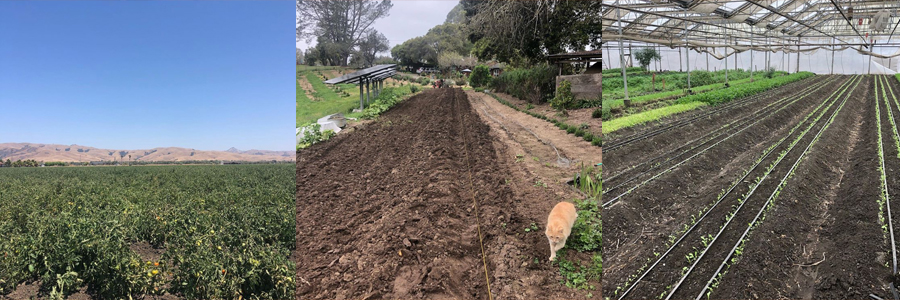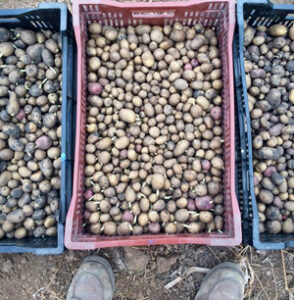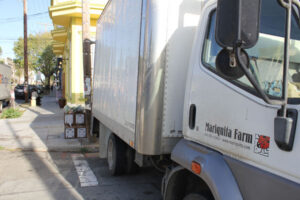At Home with Ambiguity

If you’re not “at home” with ambiguity, surprises, and triage as a lifestyle, then farming probably isn’t for you, but even by that measure 2020 has been extra special. Now, as the days get shorter, the nights get cooler, and winter lies just over the horizon, it’s natural to take a deep breath, look around, and… First, there’s the climate to consider.
Dennis Tamura, my friend and neighbor who runs Blue Heron Farm, just down the road, asked me the other day how I was planning and planting for the winter. “We use to wrap most harvesting up by Thanksgiving,” he said, “because after that it was too wet, but now it seems like there’s been a shift and we can keep going all the way through December. But the rains seem to come later now and it’s harder to get an early start in the spring.” I agreed. Yes, it’s only anecdotal evidence, but our climate does seem to be changing in ways that already affect our behavior. I told Dennis I’m still planting some salad and cooking greens in my outdoor ground that I’m planning on picking into the new year, but because I can’t trust the weather to “stay put” I’m also planting in the greenhouse so that, one way or another, I’ve got crops to pick. For each of the last several years we’ve had enough late rain to delay our entry into the outside ground I’ve got here in Corralitos until May. And, just to be really sure we have a harvest we can count on, we’re also planting out in the Hollister-Gilroy area of San Benito County that we know as “The Bolsa” because it’s in a rain shadow of the Santa Cruz Mountains. Even when it’s raining on this side of the hill it’s dusty 30 miles to the east. Right now we’ve got chicories, lettuces, and brassicas, like cauliflower, planted over there.
 Then there’s the political climate to consider. If the vagaries of the weather weren’t enough, many farmers have to keep an eye on the political climate. Stone fruit growers, for instance, can be dramatically affected by policies out of Washington that would seek to sharply limit or decrease the supply of immigrant, migrant labor. Since native born people seem absolutely unwilling or unable to do this work, there have been in recent years, many examples of fruit crops falling from the trees or rotting on the ground. I’ve noticed that there’s more open ground around Watsonville than I’ve ever seen as berry farms have shut down or moved to Mexico in part because of persistent labor shortages. Grain farmers who count on foreign demand to keep prices up can also suffer when Federal embargoes affect the market. None of this ever affects me directly because we have a diverse planting schedule for fresh produce sold locally but I do need to make sure I have steady work for my crew all year long because the housing situation is so dire that if I lay people off seasonally they’ll have to move to someplace where they can afford the rent and then I’ll struggle to replace them. We work all year long because we have to- not because it’s easy to farm in the winter. We are planning on shutting down for a week or so round Christmas though, just to rest. And later, from the third week of January through the second week of February, we won’t be harvesting, but we will be doing production work in the greenhouses ahead of our early spring harvests.
Then there’s the political climate to consider. If the vagaries of the weather weren’t enough, many farmers have to keep an eye on the political climate. Stone fruit growers, for instance, can be dramatically affected by policies out of Washington that would seek to sharply limit or decrease the supply of immigrant, migrant labor. Since native born people seem absolutely unwilling or unable to do this work, there have been in recent years, many examples of fruit crops falling from the trees or rotting on the ground. I’ve noticed that there’s more open ground around Watsonville than I’ve ever seen as berry farms have shut down or moved to Mexico in part because of persistent labor shortages. Grain farmers who count on foreign demand to keep prices up can also suffer when Federal embargoes affect the market. None of this ever affects me directly because we have a diverse planting schedule for fresh produce sold locally but I do need to make sure I have steady work for my crew all year long because the housing situation is so dire that if I lay people off seasonally they’ll have to move to someplace where they can afford the rent and then I’ll struggle to replace them. We work all year long because we have to- not because it’s easy to farm in the winter. We are planning on shutting down for a week or so round Christmas though, just to rest. And later, from the third week of January through the second week of February, we won’t be harvesting, but we will be doing production work in the greenhouses ahead of our early spring harvests.
 And then there’s the economic climate. This year, the Covid 19 plague, wiped out the restaurant market that we’d counted on for a substantial amount of business, and that forced us to make a series of rapid adjustments. Thanks to you and your support, we’ve been able to “weather the storm” so to speak. We’ve kept a crew going, kept planting crops, kept harvesting, and now we’re planning out year 2021 with you and your needs and expectations first and foremost in our mind. Some crops, like our artichoke crop, are already planted, and just waiting for the spring rains to come. For other crops, it’s time to buy seed ahead of the new season. I’ve already got potatoes in the cooler that are destined to be planted out in February- weather permitting. Seed got harder to get this year- and became more expensive- so I’ll be buying my seed earlier than I have in the past. And I’ve been saving seed from my own crops. Carmen will clean some bean seed this afternoon, beating on the pods with a stick and winnowing the crushed hulls away from the seeds, just like people have done for thousands of years. Some things never change.
And then there’s the economic climate. This year, the Covid 19 plague, wiped out the restaurant market that we’d counted on for a substantial amount of business, and that forced us to make a series of rapid adjustments. Thanks to you and your support, we’ve been able to “weather the storm” so to speak. We’ve kept a crew going, kept planting crops, kept harvesting, and now we’re planning out year 2021 with you and your needs and expectations first and foremost in our mind. Some crops, like our artichoke crop, are already planted, and just waiting for the spring rains to come. For other crops, it’s time to buy seed ahead of the new season. I’ve already got potatoes in the cooler that are destined to be planted out in February- weather permitting. Seed got harder to get this year- and became more expensive- so I’ll be buying my seed earlier than I have in the past. And I’ve been saving seed from my own crops. Carmen will clean some bean seed this afternoon, beating on the pods with a stick and winnowing the crushed hulls away from the seeds, just like people have done for thousands of years. Some things never change.
 Lastly, I’d like to thank our pick up site hosts. Without the generosity of our site hosts we would not be able to do this business. Shelley who has been our mystery box coordinator for some time now does an amazing job pulling all the pieces together necessary in making this a viable business. She works with the hosts and the customers with untiring customer service. Thanks to all of you we can provide a program that works! On a helpful note, in keeping the pickup site orderly we ask that everyone folds and stacks their boxes prior to leaving the site.
Lastly, I’d like to thank our pick up site hosts. Without the generosity of our site hosts we would not be able to do this business. Shelley who has been our mystery box coordinator for some time now does an amazing job pulling all the pieces together necessary in making this a viable business. She works with the hosts and the customers with untiring customer service. Thanks to all of you we can provide a program that works! On a helpful note, in keeping the pickup site orderly we ask that everyone folds and stacks their boxes prior to leaving the site.
All of us here at Mariquita thank you for your support.
Andy and the crew at Mariquita farm
© 2020 Essay by Andy Griffin. Photos by Andy Griffin.


